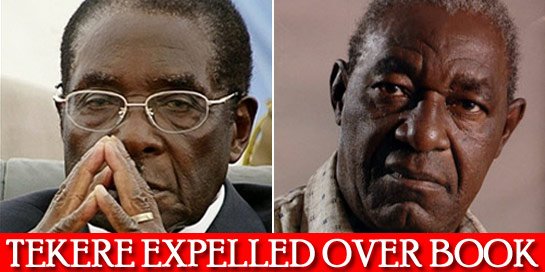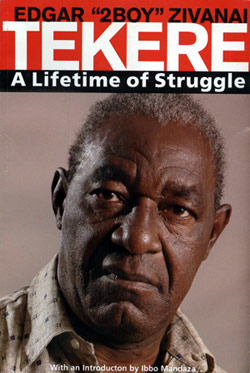In his new book, A Lifetime of Struggle, Edgar Tekere delves into his controversial Life starting with his humble upbringing as the son of a Makoni Princess, his odssey into
New Zimbabwe.com continues with its exclusive extracts from the book which captures some of the most extra-ordinary events during the bush war that led to the country’s independence:
Last updated: 02/28/2007 20:57:44
IN 1968, Ndabaningi Sithole unilaterally decided that he could start a revolution on his own, and he began smuggling his own messages out of the prison. His courier was a Mrs Ntuka, his sister-in-law, who ever seemed to have any problem obtaining any clearance to visit the prison. She passed them all on to the Special Branch, and so Sithole was arrested. While he was being interrogated, the Special Branch operative managed to persuade him to disengage from the armed struggle, arguing that if he agreed to do this, he would be released from prison and could work “constitutionally”.
He was then returned into custody with us, and tried to persuade us along those lines. I was actually in hospital at that time, as I had been suffering from a peptic ulcer, which eventually burst. He tabled a resolution to the others, that they all agree to work with the Special Branch, in order to secure their release from prison. But the others all objected. Sithole then moved to suspend the leadership. As I arrived back from hospital, I was greeted by the spectacle of a small huddle of people in gloomy discussion, and Maurice Nyagumbo came to tell me what had happened. I immediately burst in on the group with, “How can you grown men sit there and listen to this nonsense?” Remember that this betrayal came after the Battle of Chinhoyi, news of which we had greeted with wild rejoicing, and Sithole had composed a song to celebrate.
Maurice Nyagumbo was absolutely devastated by this betrayal on the part of Sithole. I remember him sitting with one hand on his face repeating, “How could he have done this?” He was so disturbed that the rest of us kept watch over him in case he decided to take his own life. In view of his suicide many years later, after independence, I wonder if this could indeed have happened then.
We were terribly disappointed in Ndabaningi Sithole. It was he who had first articulated the need for armed struggle at the Gweru Congress. Subsequently, he had commanded Chitepo and others to proceed to war. That command had been delivered to all the Frontline States, whose leaders respected us on that basis. President Nyerere of
In 1973, following the hastily arranged ‘détente’ exercise, it became evident that we would soon be released. We were transferred briefly to Connemara Prison in the eastern Highlands while Kwekwe Prison was made ready to receive us.
It was at Kwekwe that we decided that, if we were to be released, we could not possibly have a leader who was so ready to compromise his principles, and we determined to sack him.
There were three of us in our cell, Enos Nkala, Maurice Nyagumbo and I. Ndabaningi Sithole was with Robert Mugabe and Moton Malianga in another. Eventually our cell decided that we would move a motion to remove Sithole from the presidency. But Mugabe and Malianga were against this. Moton Malianga was appointed to chair the proposed meeting, thus removing him from a voting position. We approached Mugabe but he rejected the proposal. We told him, “Malianga is chairing the meeting and cannot vote. So if you vote for Sithole, you will be in the line of fire when we make our denunciation, and we are three votes to your two, and we will win the vote in any case. So the best thing you can do is to abstain from voting.”
Eventually, Mugabe reluctantly agreed to do this.
It is, therefore, not true, as many have said, that Mugabe actively campaigned for the sacking of Sithole.
We called the meeting, and my colleagues asked me to table the motion for the sacking of Sithole, and I spoke at length on his misdemeanours against the Party before tabling the motion. Sithole responded angrily:
“You little boy – a kid without political stature – dare challenge me, a gentleman with huge political standing! Who in this world would know that there is a Tekere? You are nobody. Nothing!”
He went on to say, “You are committing a very serious crime. Remember that I am the Commander-in-Chief of the ZANLA Forces. You will be tried by a Court Martial, and your punishment will be death by execution at the hands of the ZANLA Forces! This is an act of Treason!”
My reply to this was, “You boast a lot about being a big political figure, let’s just see. Let the daggers be drawn out – yours is long and sharp, mine is short and blunt, but my blunt dagger will outdo yours. It is you who are on trial for treachery; you should be facing a Court Martial.”
The votes were cast, with three in favour of the sacking, one against (Sithole), and one abstention – Mugabe. Once more Mugabe did not want to “break” with his leader. His abstention was total. He sat silently in the meeting and did not raise a finger. This is when he was appointed the head of the Party. For the structure was clear on this. Since the Vice President, Leopold Takawira, had died, Mugabe, as Secretary General of the Party, was the next in line. So there were no machinations on his part, to “wrest power from Sithole,” as many have claimed. Indeed, he actively did not want the sacking of Sithole, just as he had not wanted Nkomo to be sacked.
In December 1974, a rebellion by ZANU cadres on the frontline in
The leaders of the Frontline States, which comprised all the countries in the region surrounding Rhodesia and South Africa – Tanzania (Julius Nyerere), Botswana (Sir Seretse Khama), Mozambique (Samora Machel, as the leader of the liberation movement, FRELIMO), and Angola (Agostinho Neto was in a similar position to Machel) – were pressing for us to unite. They were concerned about the violence within ZANU and between ZAPU and ZANU. They wanted ZANU and ZAPU to unite under the UANC, or United African National Council, to be led by Bishop Abel Muzorewa. Ian Smith, under pressure form the South Africans, was part of the agreement, which all concerned thought would lead to an end to the Armed Struggle and an immediate ceasefire. Ndabaningi Sithole was agreeable to this proposal, but the rest of us were agreed that we did not want this to happen. We had not achieved any of our demands, and it was not yet time to end the Armed Struggle. Herbert Chitepo was the only one of the external leaders to consult with us and make the views of the internal group known to everyone.
We were in a difficult position. The leaders of the Frontline States were not aware that we had only madder use of Muzorewa in order to lead the people to reject the Pearce Commission proposal. At that time, both ZANU and ZAPU leadership were detained, but we had to find someone to mobilise the population to reject the Pearce Commission proposals. We thought of Bishop Abel Muzorewa who was not a politician, but who had preached some sermons that we liked, and so we smuggled communications to him, asking him to lead the campaign. Twice, Muzorewa refused, but the third time he accepted our request. Unbeknown to us, ZAPU, without consulting us, had also asked Muzorewa the same thing. And so Muzorewa was able to say he had the support of both ZANU and ZAPU. Indeed, he now saw himself as the Commander-in-Chief of both ZIPRA and ZANLA; he thought it was time to stop the war and compromise with Smith.
And so in 1974, a meeting was held in
Those absorbed into the UANC were Robert Mugabe, Enos Nkala, and the top ZAPU leadership. The Agreement signed, we were returned to New Sarum airbase (now Manyame) near
The idea was that we ex-detainees would go out into society and do “normal” political work towards a new Constitutional arrangement, while those outside the country would arrange for the ceasefire.
Instead, we intended the exact opposite. Immediately, we started recruiting intensively for the war effort, by now almost at a standstill because of the infighting that had been going on in
At 8.05am on 18 March 1975, Chitepo was assassinated in
Zambian president Kenneth Kaunda, commissioned an inquiry into Chitepo’s death. The report of the Special International Commission on the Assassination of Herbert Wiltshire Chitepo, commissioned by the Zambian government in 1976, lists as having been responsible for the killing: former ZANLA commander Josiah Tongogara; Rugare Gumbo, who was then the secretary for information and publicity; Henry Hamadziripi, who was then secretary for finance; as well as the then secretary for public and social welfare, Kumbirai Kangai; and secretary for administration Mukudzei Mudzi. All these were immediately arrested by Kaunda after the blast.
This meant that there was no-one left to co-ordinate the war effort. We held a meeting at the Mushandira Pamwe Hotel in Highfield, and conducted a “round robin,” to select who would go to
I had always been committed to the armed struggle, and moreover, as the leader of the Youth, I was the obvious choice. For the youth are after all the lifeblood of the army: it is the young who do the fighting. But I was a junior member in terms of the Party structures, a younger man, and a deputy secretary only. Julius Nyerere had once said, “Who is this Tekere boy who dares unseat a president in prison?”
From
This was how the decision was made. Our long years of exile and real struggle and hardship were soon to begin.
A Lifetime of Struggle by Edgar Tekere is published by Sapes Books in
To order any of the books, E-mail: ibbo@sapes.org.zw or Call +263-4-252961/5 OR +263-4-704921, Fax: +263-4-252964















No comments:
Post a Comment